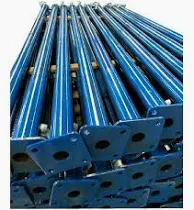Nov . 08, 2024 07:52 Back to list
Concrete Wall Formwork Solutions for Efficient Construction Projects
The Importance of Formwork in Concrete Wall Construction
In the dynamic world of construction, the role of formwork in the building of concrete walls cannot be overstated. As a crucial element in the construction process, formwork serves as the temporary or permanent molds that hold the concrete in place until it hardens. This article delves into the importance of formwork in concrete wall construction, its types, and the factors to consider when selecting a formwork system for your project.
What is Formwork?
Formwork refers to the molds used to shape and support the concrete until it gains sufficient strength to support itself. Typically made from various materials such as wood, steel, or aluminum, formwork provides the necessary structure to create beams, columns, slabs, and walls. The quality of the formwork directly impacts the aesthetic quality of the finished product and its structural integrity.
Types of Formwork
There are several types of formwork that a concrete wall company can utilize, depending on the nature of the project.
1. Traditional Timber Formwork This is one of the most common types of formwork used in concrete wall construction. It is made from wooden planks, which can be easily cut and shaped to fit any design. Although cost-effective, timber formwork can be labor-intensive and may not be reusable for large projects.
2. Steel Formwork Steel formwork is highly durable and can be reused multiple times, making it a popular choice for large-scale projects. It can withstand the pressure of wet concrete and is known for providing a smooth finish. However, it can be more expensive compared to timber.
3. Aluminum Formwork Similar to steel formwork, aluminum is lightweight and can be used repetitively. It is particularly popular in multi-story buildings due to its ease of handling and assembly. The aluminum formwork system speeds up the construction process and produces a high-quality finish.
4. Precast Concrete Formwork This method involves creating concrete panels offsite, which are then transported to the construction site for installation. This approach can significantly reduce construction time and labor costs while ensuring consistency in quality.
Advantages of Using Quality Formwork
1. Structural Stability Properly designed and executed formwork ensures that the concrete walls maintain their shape and structural integrity as they cure. This is critical for load-bearing walls and structural components.
formwork concrete wall company

2. Cost Efficiency Investing in quality formwork can lead to substantial savings in the long run. While the initial cost may be higher, reusable formwork systems reduce the overall material waste and labor costs associated with the construction.
3. Aesthetic Qualities The finish of concrete walls often depends on the formwork used. High-quality formwork can result in smooth, uniform surfaces that require less finishing work, saving time and additional costs.
4. Speed of Construction Efficient formwork systems can accelerate the construction timeline. Temporary formwork allows for the rapid setting and curing of concrete, which can lead to quicker project completion.
Factors to Consider When Choosing a Formwork System
When selecting a formwork system for a concrete wall project, several factors should be taken into account
- Project Scale The size and scope of the project will determine the appropriate type of formwork. Larger projects may benefit from reusable systems like steel or aluminum.
- Budget Establishing a budget early on can help in selecting the right formwork without compromising quality.
- Timeline Assess the project timeline to ensure that the chosen formwork system can be assembled and disassembled quickly as needed to meet deadlines.
- Design Complexity More intricate designs may require specialized formwork, which could affect both the complexity and cost of the project.
Conclusion
A concrete wall company must recognize the pivotal role formwork plays in ensuring the success of a construction project. From improving structural stability to enhancing aesthetic appeal, the right formwork system can make a significant difference in the outcome of concrete wall construction. Investing time and resources into choosing the proper formwork not only leads to cost savings and efficiency but ultimately contributes to the overall quality of the construction project. Whether it's for residential, commercial, or industrial applications, the importance of formwork in concrete wall construction is undeniable.
-
Adjustable Heavy Duty Props for Slab Formwork - Max Load & Safety
NewsAug.30,2025
-
Premium Formwork Wing Nuts & Tie Rods | Factory Supplier
NewsAug.29,2025
-
Expert Ringlock Scaffolding: Durable, Safe, Efficient Solutions
NewsAug.28,2025
-
Ringlock Scaffolding: Strong, Safe & Efficient Solutions
NewsAug.27,2025
-
OEM Column Formwork: Circular, Curved & Inclined Solutions
NewsAug.26,2025
-
Premium Scaffolding Jacks: Stable, Adjustable & Durable
NewsAug.25,2025